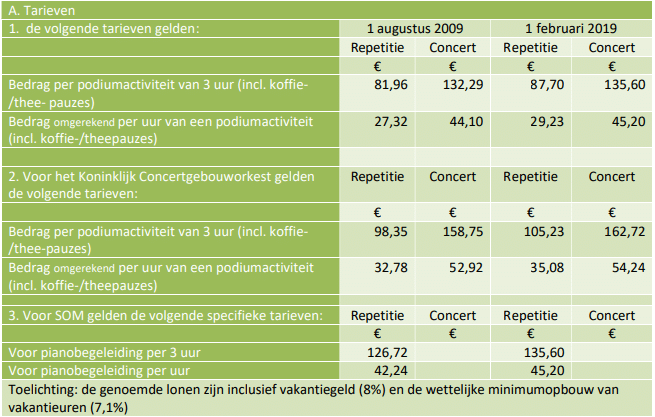[update: they get even less, see post below] We received confusing news last weekend. The occasion was the festive announcement by the organisers of the Eurovision Song Contest that a special symphonic happening would take place at the final in Rotterdam. Invited were third-year and master students of Rotterdam Conservatoire, part of Codarts, as well as young professional musicians. A 'fee' would be available for the performances. Students who had inquired informed us that the 'fee' was 100 euro, but that rehearsals would be at their own expense. Three sources seemed to us enough to make a story out of it, and we asked the e-mail-only organisation for a response.
That did not come immediately within the hour, after which we the story put online. Then they did respond, four hours later, saying that we were completely wrong. How much the musicians did get, the spokesman did not know one, two, three, but it was more than 100 euros. 'We pay the remplaçant fee,' he explained, but when asked if that also applied to the students, he initially had to refuse to answer. After he inquired, the organisation reported that things would be paid entirely according to the 'remplaçants' collective agreement', no one excepted, but that they had put nothing about the 'fee' in the advertisement because they did not yet know how many of the eight days to be kept free would actually be rehearsed and performed.
Then we do the math.
But let's take a look at that 'remplaçant collective agreement'. First, that word: remplaçant is French for 'substitute'. You know, that guy who is deployed in the last minute and scores the winning goal of the final. Anyway: those substitutes were outlaws for a long time. In recent months, there was also a lot to do about it, because even the most heavily subsidised orchestras not only tried their hand at it, but sometimes let people play for free.
In practice, the term 'remplaçant' seems to stand for any professional musician who is not in permanent employment with an ensemble or orchestra. The collective agreement has thus become a guide to setting rates for ordinary freelance musicians. Only, the rates are thus idiotically low. And, since you can only be a remplaçant if you are employed by a foundation for the deployment of remplaçants, you therefore do not receive the benefits of entrepreneurial status either. Unless so little Mahler[ref]A Mahler Symphony usually requires at least 120 musicians in a year, and most orchestras don't have that number on permanent staff,[/ref] that orchestras can solve it within the permanent staff. At the moment, anyway, it easily saves a few thousand euros on an annual basis. So remplaçants have to make do with their love of music and boundless ambition. Incidentally, there are also orchestras consisting entirely of freelancers and remplaçants.
Backlog.
The introduction to the remplaçant collective agreement reads as follows:
'Parties involved in the CAO for remplaçants agree that the income position of remplaçants in Dutch orchestras needs to be improved considerably. Incomes have not been increased for a long period of time, which has increased their relative and absolute disadvantage compared to permanent musicians. This while also the incomes of permanent musicians compared to reference groups (teachers of conservatoires and art education) have lagged behind'.
Now then: the amount you will collect for a concert is listed below.

135.60€ is not very much if that is gross, and gross it is. But it's even grosser than you think. At least when betting on something as big as the Eurovision Song Contest. Because you could count yourself a bit richer if you assume that you rehearse each of those days, and perform three of those days as well. So then you have 8 rehearsals at €87.70 and also 3 performances at €135.60. Is all together, gross: 1108.40€. But you won't get that, we can already tell you.
Rehearse or vote?
Why this is so, you can read:
'The rehearsal immediately preceding a concert counts as part of that concert and, as such, is counted as part of the stage activity, for which the employee receives the concert rate listed in Annex 2. The waiting time between this rehearsal and the concert, not being lunch and/or dinner breaks of 30 minutes or more, shall be counted as working time.' (Article 4.6)
Then the maximum fee suddenly drops to €845.30. Does that article 4.6 suddenly cost you €263 and a dime. So then you are indeed at that 100 euros-and-something per day.
No hope
Everyone who signed the remplaçants' collective agreement is aware of the paltry nature of the allowances agreed in it. From the entire CBA there is hope. In a new future, subsidies should be such that remplaçants are paid at least as much and can work under the same conditions as their salaried colleagues. Problem is that only very recently the culture minister said that the improvement of working conditions does not lead to additional subsidy. Indeed, the shuffling within existing budgets is taking such dramatic shape that it is precisely the temporary workers who will find it even more difficult.
How difficult, you can see from the Eurovision Song Contest. That gets a 25 million euro subsidy, appoints an expensive management, pulls out all the stops for a brilliant party, but pays the people who provide the symphonic spectacle with their craftsmanship an amount that is paltry even as a tip. In this case, more subsidy mainly leads to more 'bling' and better-paid 'creatives'.
By the way, the Song Contest will have no trouble recruiting the required number of musicians. People would participate even if they had to put in money. Because unforgettable and fun for your CV.
A quarter of what they are entitled to! (How Public Broadcasting condemns musicians to beggary)
